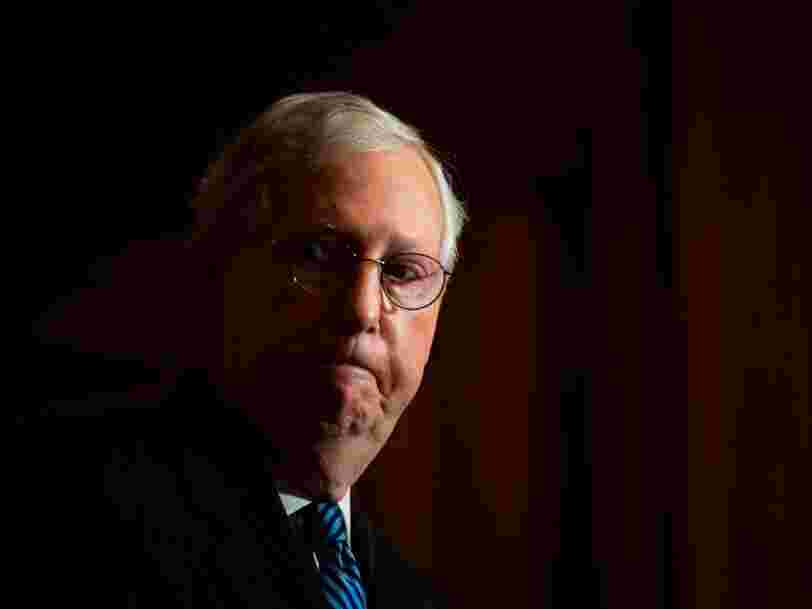A weekend stimulus deal could be derailed by a GOP measure to rein in the Federal Reserve
Joseph Zeballos-Roig- Mitch McConnell
-
Recevoir tous les articles sur ce sujet.
Vous suivez désormais les articles en lien avec ce sujet.
Voir mes sujets suivisCe thème a bien été retiré de votre compte

The plan from Sen. Patrick Toomey has triggered a clash that jeopardizes the odds of a coronavirus relief package to pass Congress by Sunday night.
- A GOP measure to limit the Federal Reserve's lending powers imperiled the odds of a weekend stimulus deal on Saturday.
- Republican and Democrats fought bitterly over the Fed's emergency aid programs, which have assisted state and local governments as well as mid-sized businesses.
- Democrats argued the Republican proposal could cripple the incoming Biden administration's ability to respond to the current economic crisis.
- Visit Business Insider's homepage for more stories .
A last-minute Republican push to curtail the Federal Reserve's lending authority formed a major roadblock in stimulus negotiations on Saturday, threatening to stretch the talks on a $900 billion emergency spending package into next week.
The clash over the Fed between Republicans and Democrats appeared to intensify on Capitol Hill. Politico reported that Senate Majority Leader Mitch McConnell told senators in a caucus call that Republicans should stand firm with Sen. Patrick Toomey. The Pennsylvania senator was demanding to cut off the central bank's emergency lending powers after they sunset on Dec. 31.
Toomey, the incoming chair of the Senate Banking Committee, called it "a bright red line" for him this week. The proposal could imperil the odds of a relief package passing both chambers of Congress given the deadline for government funding to dry up on Sunday evening.
Lawmakers authorized a two-day funding extension late on Friday to settle longstanding policy differences. The $900 billion federal assistance package is expected to include $600 stimulus checks for many Americans, $300 federal unemployment benefits, vaccine distribution funds, as well as another round of small business aid.
Republicans say that keeping the Fed's lending programs in place for state and local governments and mid-sized businesses could cause the institution to overstep its historic boundaries as a lender of last resort.
That was echoed by Sen. John Kennedy of Louisiana, another GOP member of the Senate Banking Committee. He told reporters maintaining those programs could turn the Fed into "a commercial bank" and said "we're gonna stand firm."
Kennedy also suggested relief talks to resolve the issue could stretch on to "New Year's or Christmas Eve."
Democrats are fiercely resisting the measure. They argued it would cripple President-elect Joe Biden's ability to manage the recovery and jeopardize the Fed's capacity to respond to future recessions as well.
"The last thing America needs right now is to make it tougher to help people in communities and that's what this proposal does," Sen. Ron Wyden, ranking Democrat on the Senate Finance Committee, said in a brief interview on Capitol Hill. He added it was "a significant sticking point" in the volatile negotiations.
"There's no reason the Treasury and the Fed in the Biden Administration should have fewer tools to address an economic crisis than the Trump Administration had," Bharat Ramamurti, a Democratic panelist on the Congressional Oversight Commission policing the Treasury and Fed's economic response, tweeted on Saturday.
Sen. Mitt Romney of Utah told Business Insider in a brief interview that now was not the time to pursue major Fed reforms, and that could wait until next year.
"I think the Fed should be returned to the powers it had prior to the CARES Act, but I think other reforms should wait for another time," Romney said.
Senators discussed the divide during a confirmation vote, and a group that included Toomey and Romney met in Senate Minority Leader Chuck Schumer's office on Saturday. After leaving, Toomey said, "I think that we should be able to get a deal done."
The fight on Capitol Hill elicited a rare public statement from Ben Bernanke, who served as chair of the Federal Reserve during the 2008 financial crisis. He said the central bank's emergency lending powers from before the pandemic should remain "fully intact," adding it was "vital" for its ability to respond to future financial or economic crises.
A failure from Congress to pass a new relief package carries potentially calamitous consequences for many Americans. Unemployment claims have risen for the past three weeks, and nearly 13 million people are threatened with the loss of all their unemployment assistance if some federal measures are not renewed by year's end.
An eviction on moratoriums also expires on December 31, which would put millions of Americans at risk of losing their homes.
Inscrivez-vous gratuitement à notre newsletter quotidienne
Via PakApNews